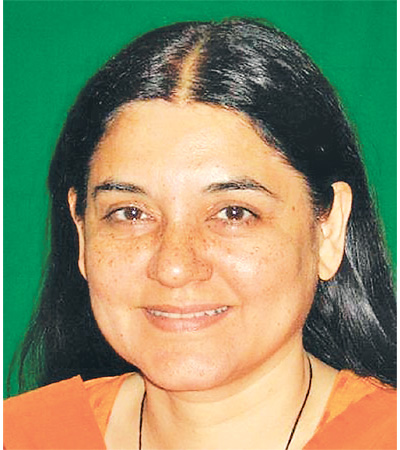Opinion
Saints not sinners
For Rumi, abstaining from animal slaughter was vital in search for the divine
Maneka Sanjay Gandhi
Food is at the core of every religion because it signifies the most important commandment of the universe: those shalt not harm. People who eat meat cause vast amounts of suffering, not just to the animals but to the planet itself. Jalal al-Din Muhammad Balkhi known simply as Rumi, a 13th century (1207-1273) Muslim poet, jurist, theologian and Sufi mystic, born in Balkh (in Iran then and now in Afghanistan) and died in Konya, now in Turkey. Known as Maulana and Maulawi (master), he is regarded as one of the greatest Sufi spiritual masters and poets, famous for his epic Masnavi-yi Manavi (“Spiritual Couplets”), which widely influenced mystical thought and literature throughout the Muslim world. Upon his death, his followers, and his son, founded the Mevlevi Order, also known as the Order of the Whirling Dervishes.
Rumi’s influence has spread across nations and ethnic divisions. Iranians, Tajiks, Turks, Greeks, Pashtuns, Muslims of different nationalities. His poems have been widely translated into most of the world’s languages and have influenced literature hugely, specially Persian, Turkish, Urdu and Pashto. Sufism, or Tasawwuf, is the inward mystic philosophy, the spiritual dimension/discipline of Islam. Sufis belong to different orders, congregations, formed around a grand master. These strive for perfection of worship. Sufism is perceived as a peaceful and apolitical form of Islam, particularly suited for interreligious dialogue and intercultural harmonisation in pluralist societies; a symbol of tolerance and humanism; flexible and non-violent.
While Sufis strictly observe Islamic law, they are ascetics, firm in their practice of Dhikr, the remembrance of God. Sufis believe that by pledging allegiance to Muhammad spiritually they may connect with God. “intensive devotion, pious abstemiousness and pondering the divine mysteries” is the Sufi way, the “science of purifying the heart”.
While all Muslims believe that they are on the pathway to Allah and hope to become close to god in paradise-after death and after the last judgment-Sufis also believe that it is possible to draw closer to god and embrace the divine presence in this life through “repentance from sin, the purging of contemptible qualities and evil traits of character, and adornment with virtues and good character.”
Devotion to Muhammad is an exceptionally strong practice within Sufism. Rumi attributes his self-control and abstinence from worldly desires as qualities attained by him through the guidance of Muhammad. Dhikr is the remembrance of Allah commanded in the Qur’an for all Muslims through a specific devotional act, such as the repetition of divine names and supplications from Hadith literature and the Quran. Ritualised dhikr ceremonies of the Sufis include “recitation, singing (the most well known being Qawwali music), instrumental music, dance, incense, meditation, ecstacy, and trance.”
Sufi whirling originated and is still practised by the Sufi Dervishes of the Mevlevi order. It is a dance through which dervishes aim to reach the source of all perfection. This is sought through abandoning one’s egos, personal desires, listening to the music, focusing on God, and spinning one’s body in repetitive circles, seen as a symbolic imitation of planets in the Solar System orbiting the sun.
At the age of 12, Rumi, born in a Muslim meat-eating world, wrote this quatrain and became a vegetarian till he died.
Rumi believed that all lives were sacred: Taa’shif nifaak b’astz sang (Even a seemingly lifeless stone has a degree of consciousness; respect it). Rumi was a staunch vegetarian and shunned even milk and milk products. He even refrained from sacrificing animal/s as an Islamic ritual on Eid-Al-Adah (Bakrid).
Rumi believed what we eat, directly influences our thinking. If we consume an animal, its blood and gore will make us act like a slaughterer. When Rumi died his body was interred and a shrine, the Yesil Türbe (Green Tomb), was erected over his place of burial. His epitaph reads:
When we are dead, seek not our tomb in the earth, but find it in the hearts of men.
Rumi believed passionately in the use of music, poetry and dance as a path to reach God. It was from these ideas that the practice of whirling dervishes developed into a ritual form. In the Mevlevi tradition, worship “represents a mystical journey of spiritual ascent through mind and love to the Perfect One. In this journey, the seeker symbolically turns towards the truth, grows through love, abandons the ego, finds the truth and arrives at the Perfect. The seeker then returns from this spiritual journey, with greater maturity, to love and to be of service to the whole of creation without discrimination.” And that includes animals.
There is a belief, expressed by chroniclers, that much of his poetry was composed in a state of ecstasy, induced by the music of the flute or the drum, the sound of the water mill in Meram, where Rumi went with his disciples to enjoy nature. He found in nature the reflection of the radiant beauty, and felt flowers and birds partaking in his love. Mewlâna Jalâluddîn Rumi says, “All loves are a bridge to Divine love. Yet, those who have not had a taste of it do not know!”
I would repeat this invitation to all of you who eat the flesh of animals. Stop killing them, treat them with love and respect as another form of God and see how your happiness increases and the world changes around you.
To join the animal welfare movement contact [email protected]




 25.15°C Kathmandu
25.15°C Kathmandu





.jpg&w=200&height=120)





